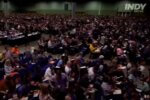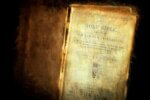I’m a relative latecomer to the prophetic movement compared to many of you reading this. In fact, I’d never heard of getting a “word from the Lord,” receiving prophetic ministry or other similar expressions until encountering a tiny Vineyard church in West Point, Ga., in the early ’90s.
There, with about 20 people who met in an elementary school off I-85, God enrolled me in His Introduction to Prophecy 101 class. The group included former drug addicts, soccer moms, welfare recipients and successful businessmen, yet the spirit of unity among us was almost tangible whenever we met. As much as we liked hearing a sermon or singing the latest Vineyard worship songs, we couldn’t wait to dive into an element most of us were brand new to: the prophetic.
Many of us shared a traditional church background, so the idea that we could listen to the Holy Spirit and have Him speak directly through us into others’ lives was novel. Because the church was a safe training ground to practice hearing God’s voice, our post-sermon “ministry times” often lasted two or three hours. No microphone, no platform, no hype—just a random group of people hungry for more of God. And whatever we learned on Sunday, we took into our daily lives through the work week and regularly came back with amazing testimonies of how God had used us to give a prophetic, life-changing word to total strangers. It was fresh, healthy and beautiful.
Fast-forward a few years and the Lord began placing me alongside some of the strongest prophetic voices in our movement. I traveled in ministry with many of them, worked with a few and even lived with a couple of their families. I watched some of the most anointed men onstage live very unanointed lives off it, which again tested me. While people oohed and aahed as these men singled out people in a crowd using childhood telephone numbers, significant dates or other “secrets” from God, I wrestled behind the scenes with how God could speak so vividly to men with such flawed character.
I failed that test and dropped out of God’s prophetic class for a season. As I struggled to process the platform hypocrisy I’d witnessed upclose, I began to notice a trend in the following years: I wasn’t alone. Countless others had “checked out” of the movement in response to being burned by the prophetic. Most had the same healthy introduction as I did, only to have it soiled by traumatic misuses of the prophetic gift.
The common denominator among these people went beyond believers being too immature to handle a well-meaning but erroneous word (which some of us undoutedly were); it was that few leaders, particularly the major “prophets” of the movement, would get real enough to publicly talk about the flip side of prophecy. What happens when you blow it? How do you handle misspoken “words from the Lord”—both those who give and receive them? I know many of these leaders and can attest to their sincerity in not wanting to taint the word of the Lord. But sadly, I don’t recall any of them ever publicly admitting when they’d missed it—or even addressing the issue.
There’s a reason fewer charismatic churches integrate the prophetic into their corporate culture today. We’re still looking for fathers and mothers of the movement such as Francis Frangipane to identify the elephant that’s been in the room far too long. Most of those burned have moved past the need for apologies. Yet if we hope to see the prophetic properly functioning in the church at large, we must stop treating it as if it’s mystical or exclusive to an elite few. It’s one of many spiritual gifts given to us by the Holy Spirit (see 1 Cor. 12:1-10).
The prophetic is messy—anyone who’s been around it for more than a few weeks knows that. But when handled correctly, it’s a wonderful and necessary part of our body life. Let’s relearn how to function with it.






Leave a Comment
You must be logged in to post a comment.